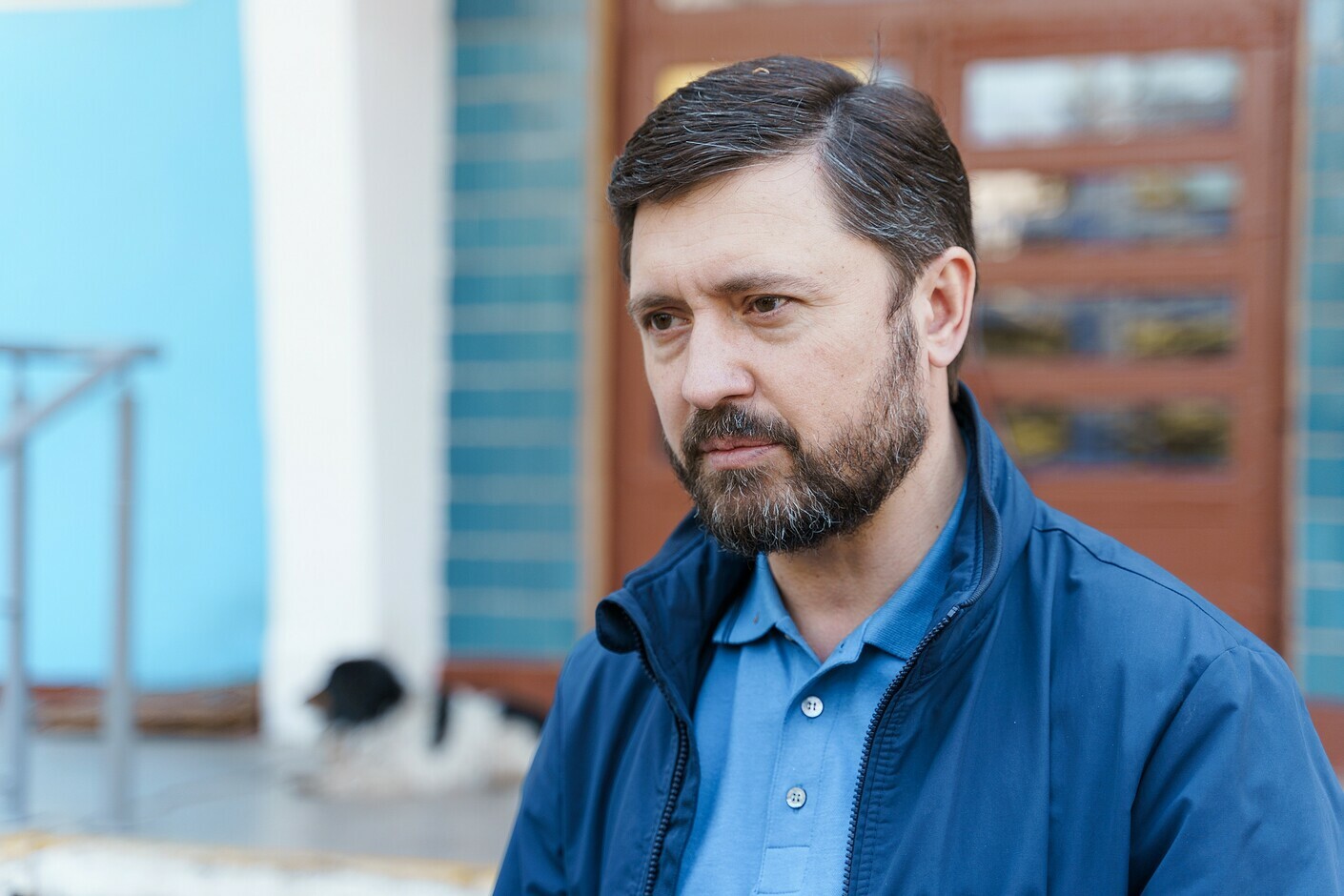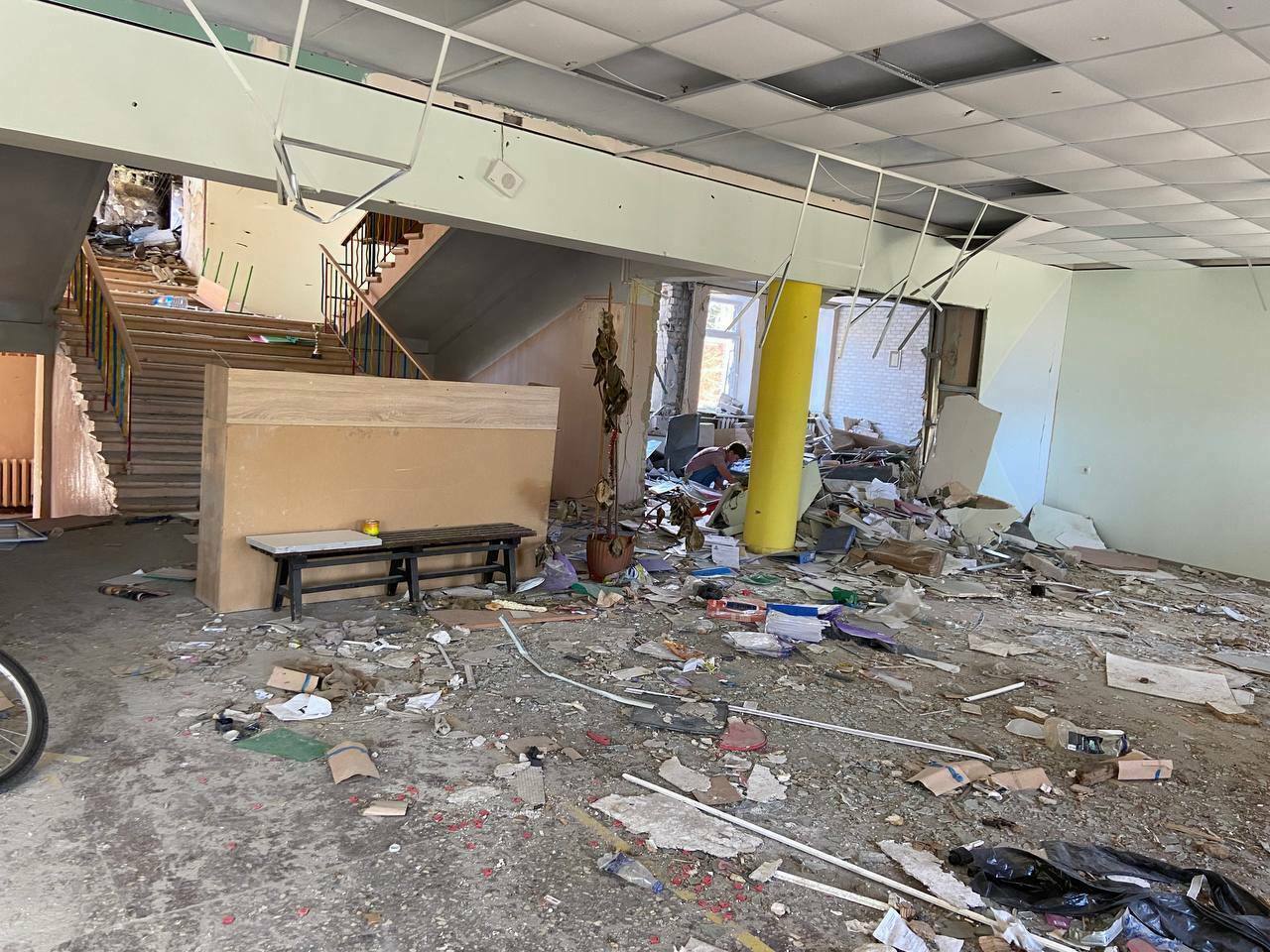“It is important for us to preserve the connection of children with Mariupol, with Ukraine, as well as the educational and intellectual potential of our city” – Vadym Boichenko

After Azovstal fell, instead of one Mariupol, two appeared. The first one is almost completely destroyed, intimidated, treacherous, filled to the brim with occupying troops and slogans, hungry, cold and having no prospects. The second one is unconquered, full of plans and focused on the future. And the further, the more the first one weakens and the stronger the second one becomes. Because the whole world supports it, giving it the energy and convincing it that it is the real one. That is why the Mariupol City Council and Mariupol schools are still working. After the liberation and reconstruction of the city, they will return and write new pages of the Ukrainian history of Mariupol. Mayor Vadym Boichenko is already working on this. Currently, he is trying to preserve the educational structure of the city — primarily, the teachers and students. They were the main topic discussed in the Decentralization conversation with the Mariupol mayor, who has held his position for seven years in a row.
Text by: Dmytro Syniak
The interview was prepared as part of the “Municipalities and Educators at War” campaign with the support of the Swiss-Ukrainian project “Decentralization for the Development of Democratic Education” DECIDE.
- What can be said about the preparation for the new academic year in the conditions of war? What are its main features?
This is an extremely difficult year from the point of view of preparing Mariupol children for the new school year. After all, they, unlike their Ukrainian peers, cannot go to their school, meet their friends and teachers. The city is under Russian occupation. Almost all educational institutions are damaged by Russian shelling, and some are left in ruins.
Hundreds of thousands of Mariupol residents managed to leave the occupation. Mariupol children are now in different parts of the country and the world. Therefore, it was important for our team to create conditions so that they could continue studying in Mariupol schools online. Our initiative was supported by the Ministry of Education and Science and the leadership of the Donetsk Regional Military Administration. Thus, we were able to launch online education in six schools: No. 10, 29, 47, 48, 54, and 66.
It was important for us to preserve the connection of children with Mariupol and Ukraine, as well as the educational and intellectual potential of our city. After all, they are the future of our Ukrainian Mariupol.

Of the 63 Mariupol schools, eight are considered to have survived
- How will Mariupol schoolchildren and students study? Will it be possible to save Mariupol educational institutions?
Mariupol teachers from various educational institutions work in the six schools mentioned. Disciplines are taught by 250 teachers. Of them, 31% work from abroad, and 69% – from the territory controlled by Ukraine.
At the beginning of September, 4,700 Mariupol children started online education at our institutions. Most students are now in Poland, Germany, and the Czech Republic.
In addition, with the support of the Kyiv City Council, the Mariupol City Lyceum, which united three Mariupol lyceums, will soon start operating in the capital. Also, Mariupol teachers joined their efforts independently and created private school No. 56. Such initiatives help us preserve the intellectual and professional potential of Mariupol in order to breathe new life into the city after de-occupation.
In addition to schools, higher and specialized educational institutions of Mariupol, which have moved to different cities of Ukraine, continue their activities in evacuation. Those who asked for our support received it. Mostly, it was related to informational support in conducting an admissions campaign.

During the shelling, most of the city’s schools were damaged and destroyed to varying degrees
- To what extent is the urban municipality involved in this preparation? What depends on it?
Our main goal as a municipality is to preserve Mariupol education. Therefore, we are working on this together with the civil-military administration of the Donetsk region and the state. The entire pedagogical staff receives salaries at the expense of the state subvention. Other school employees are paid from the local budget. Those teachers who are not involved in the educational process and are located within the territory of Ukraine receive ⅔ of the salary. Those teachers who teach remotely are paid in full.
In addition, we understand that now it is difficult for Mariupol families to send their children to school, because not everyone can do it financially. On our own initiative, we have launched a social campaign to support first graders in the “YaMariupol” (I Am Mariupol) centres. They could get all the necessary stationery for studying. It is important for children to know that they are from Mariupol and to feel the care from Mariupol even in evacuation. In addition, students of grades 2–4 received nice stationery sets. A number of projects are currently being developed to cover more children of all ages with the support that will help in the educational process. For that purpose, we are looking for partners and charitable funds.
- What does work in wartime require from the teams of educational institutions?
Our teachers have extensive experience in online education. This was due to the COVID-19 pandemic. But there are some peculiarities. Then, all teachers knew their students well, but now the classes are formed not only from different classes, but also from different schools. It is necessary to get to know some children anew, and also take into account their psycho-emotional state after the horror that they had to experience during the shelling of Mariupol.
So the teams arrange their work with children and establish communication with them. In addition, the curriculum is formed in such a way that the children have the opportunity to study in the second shift – after the schools they attend in other countries. Also, this means different time zones. Therefore, their lessons start at 3:00 p.m. Kyiv time. Since it is a “second school” for them during the day, it is better not to overburden the children. The material is presented creatively, interestingly, sometimes in the form of a game and without doing a big homework assignment. Lessons last 30 minutes. Mastering the material is as follows: 50% – in online format, 50% – on the educational platform where children can independently review the lecture, the accompanying materials, presentations, perform creative and test tasks.
Teaching is conducted in Ukrainian. Class hours on various topics are held. The first lessons started with the highlight of Mariupol, showing good and dear videos about the peaceful Mariupol.
The main role of our educators is to be teachers, psychologists and even parents. Our educators understand what our children went through, because they themselves know what surviving in the besieged Mariupol feels like. Therefore, even in the online mode, they try to be more attentive to their students.
This is how the oldest school in Mariupol destroyed by the occupiers – school No. 1 – looks like
- What is known about the state of educational institutions in the occupied territory? Did any of them survive? Are there those that will start their work, actually, in the occupation, under the guns of the occupiers?
During the shelling, most of the schools were damaged and destroyed to varying degrees. Of the 63 Mariupol schools, eight are considered to have survived. According to preliminary data, after the occupation of Mariupol, 22 schools have been destroyed by 75–100%. That is, we understand that some of them have been completely ruined and cannot be repaired. Others have partial destruction, but are not suitable for teaching children. The Russian occupiers purposefully destroyed the whole of Mariupol, they were shelling everything – from infrastructurally important objects, hospitals, schools to mass shelters and civilian buildings.
So far, they have demonstratively repaired several schools that were the least affected by the shelling. But we see behind the scenes that children study in the corridors, because the classrooms are destroyed, they are not being repaired. The occupiers took away a lot of modern multimedia equipment in an unknown direction, depriving our children not only of a happy, peaceful childhood, but also of the opportunity to receive modern education.

Dozens of educational institutions in Mariupol were destroyed or damaged by the occupiers
- Does the Mariupol City Council implement any measures that would facilitate the adaptation of students and teachers to work-study in a new place?
We are open to Mariupol families. In order to answer all questions and give advice, we have a single contact centre that our families turn to if they do not know what they need to do in a new city and how to enrol their child in school. But currently, all Ukrainian municipalities are very helpful in these matters to the displaced people, and there are no problematic issues. In addition, through our “YaMariupol” centres, the teachers who are not involved in the educational process in the online format can apply for employment. We have such a positive experience. We are currently developing a single employment system for all Mariupol residents looking for a job.
Tags:
war stories report education war stories special project
Область:
Донецька областьГромади:
Маріупольська територіальна громадаSource:
Пресцентр ініціативи "Децентралізація"
23 February 2026
У Мінрозвитку обговорили пріоритети державної політики щодо тимчасово окупованих територій України
У Мінрозвитку обговорили пріоритети державної...
Під головуванням заступника Міністра розвитку громад та територій України Олексія Рябикіна відбулося обговорення...
23 February 2026
Відкритий діалог заради розвитку громад: які...
Публічні консультації, круглі столи, презентації досліджень, експертні зустрічі — Комітет Верховної Ради України з...
23 February 2026
Профорієнтувати, навчати та заробляти. У Васильківському коледжі створили сучасний кулінарний хаб
Профорієнтувати, навчати та заробляти. У...
Замість старих 40-літрових каструль – «кулінарний комп’ютер» iVario, замість радянської плитки – керамограніт і...
20 February 2026
Місцева статистика: Як перетворити розрізнені...
У Києві відбулася стратегічна зустріч "Статистика громад", організована Державною службою статистики України за...